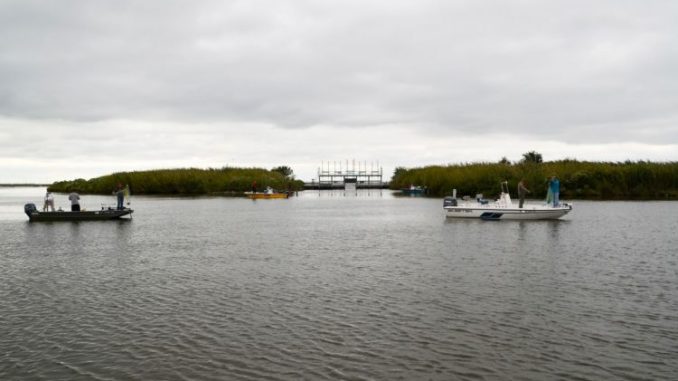
The Cameron-Creole Watershed Project, like many marsh restoration projects, carries fishing controversy baggage.
Capt. Erik Rue did his best to provide a balanced explanation of what has gone on.
Prior to its construction, the marshes of the area were noticeably eroding: Islands were disappearing and ponds were getting wider.
But fishing was very good, both for speckled trout and redfish.
Commercial shrimpers were early opponents to the project, citing plummeting catches of shrimp.
Then trout fishing within the footprint of the project steeply declined.
“Trout boats would be all in here,” Rue said, waving his arm over the marsh. “Now it’s no longer a trout spot.”
Rue admitted that it is difficult to pinpoint a cause-effect relationship between the project and trout fishing success in the lake. But he noted that after Hurricane Rita in 2005 blew out the levees separating the project area from the lake, essentially reconnecting the natural bayous to the lake, there was increased fishing success.
“Trout fishing exploded like you can’t imagine,” Rue said.
The levees were down for a couple of years before being rebuilt with sheet pilings, he ezplained.
With their rebuilding, the lake’s trout fishery began a gradual decline.
In spite of that, Rue doesn’t feel locals carry a lot of hostility to the project.
“In fact, a lot of people love it,” he said. “In the fall, the parking lot at Hebert’s (Marina) is full of trucks and boat trailers. They are all cast-netting for shrimp, chicken-necking for crabs or anchored fishing.
“They will tie their boats to each other; it’s sickening. “They will troll up and cast-net 15 feet from your boat while you are fishing. Boats are steadily going in and out over your lines, and people never stop catching. People love the weirs now.”
And the guide admitted that, despite the negatives, the project is probably a good thing.
“I personally think that the fishing would be better without them, but they are a necessary evil,” Rue said. “Without them, I think this area would be severely eroded. Deeper in the system, the marshes have actually regrown.
“In spite of the fact that they have impacted my fishing, if the marsh is still here for my grandkids’ kids, they were a great thing. I think that’s true all along the coast. People think about what’s happening to them now, not the distant future.”